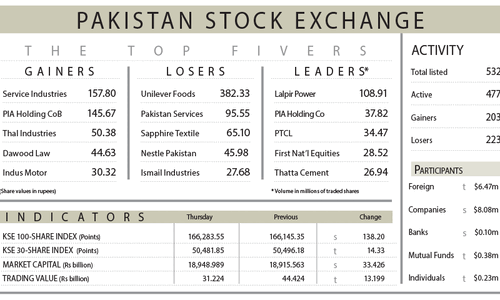DETROIT: After years of avoiding confrontation, the US labour movement is reasserting itself. From the ports of Los Angeles to the car plants of Detroit, unions are demanding payback for sacrifices they say helped revive the economy.
Oil workers have walked off the job for higher wages and better working conditions. Dock workers have snarled West Coast ports. Personnel staffing oil terminals at the Port of Long Beach, California, are threatening to strike. In Detroit, union leaders girding for contract talks this year will push for the first raise veteran autoworkers have received in a decade.
Union leaders are taking advantage of a tightening labour market and favourable political environment. With middle-class wages stagnating and the rich getting richer, income inequality has become a rallying cry for Democrats and Republicans alike. Reviving opportunity for all resonates with Americans who feel left out as growth picks up and the market notches record highs.
“Employers seem to think that they can push unions, the roots of the American working class, off a cliff,” said Dave Campbell, whose union local represents oil-terminal workers at the Port of Long Beach. “Well, these corporations have made a significant miscalculation in our ability to fight back. There’s a lot of labour strife now, and they could have a major confrontation on their hands.”
Campbell’s combative rhetoric evokes an era when unions had the clout to win significant lifestyle upgrades for their members. Wielding the threat of strikes and work slowdowns, organized labour helped generations of Americans join the middle class and stay there.
In recent years, however, globalisation and weak economic growth have hollowed out union power. In 1979, 21 million American workers belonged to a union. By last year, 14.6 million did. In the 1980s, strikes averaged 75 a year, according to the Bureau of Labour Statistics. Last year, there were 11.
Harley Shaiken, a labour professor at the University of California at Berkeley, has long watched the ebbing of union power and wondered if walkouts were an endangered species. The surge in labour unrest has caught his attention.
Shaiken says the main catalyst is inequality, considered the defining economic challenge of this era by everyone from President Barack Obama to Republican presidential aspirant Jeb Bush. Slow wage growth figures in deliberations by Federal Reserve officials as they consider whether to raise interest rates above zero this year.
Even with unemployment near the lowest level since 2008, central bankers have expressed concern that low wages could restrain household spending.
On Thursday, Wal-Mart Stores Inc, America’s largest private employer, said it would raise wages to $9 an hour, well above the $7.25 federal minimum wage. The move, by a retailer that has thwarted unions trying to organise its stores, strikes back at critics who say it underpays employees.
A 2011 study drew a link between the decline in union membership since 1973 and expanding wage disparity.
Those trends have since continued, said Bruce Western, a professor of sociology at Harvard University who co-authored the study.
Union workers say they took a hit on wages and benefits after the financial crisis to help keep companies and the economy afloat and expect to be rewarded for their sacrifice.
“You don’t want to be the senior partner in failure and the junior partner in success,” said Gary Chaison, a professor of labour relations at Clark University in Worcester, Massachusetts.
Since 2009, management compensation has grown about 50 per cent faster than union workers’ income. In the auto industry, real wages have declined 24pc since 2003, according to the Centre for Automotive Research.
Pat Patterson, 60, is on strike for the first time in 35 years working as a pipefitter at Tesoro Corp’s refinery in Carson, California. Patterson said his union helped the company survive the recession and now should share the wealth it has since accumulated.
“Their whole driver is greed,” he said.
“Tesoro is making record profits. There’s more profit, and they don’t want to share it with the workers.”
In an e-mail, Tina Barbee, a Tesoro spokeswoman, said “it’s very unfortunate that the union has called out on strike so many of its members — our employees — who will not be able to share in all of the rewards.”
In Detroit, Dennis Williams, the United Autoworkers’ new president, has made getting his members a raise a top priority in contract talks with General Motors, Ford and FCA US, formerly known as Chrysler Group.
And he’s not above rattling the strike sabre. Williams stressed the importance of the right to strike. During the last contract talks, in 2011, the UAW gave up that right at GM and Chrysler to help the automakers recover from their bankruptcies. Now, that power has been restored. The current four-year auto contract expires Sept 15.
“The right to collective bargaining is a building block to good economics, shared prosperity, a strong middle class and a country that believes in balanced democracy,” Williams said in a statement.
The Detroit Three are loath to increase their labour costs since that’s what helped nearly drive them out of business. They prefer to reward workers with profit sharing checks that can shrink or disappear in tough times. Detroit autoworkers have received record profit sharing for the last five years.
But Detroit’s automakers may have to boost wages, said Art Schwartz, a former GM labour negotiator who now runs Labour and Economics Associates, a consulting firm in Ann Arbor, Michigan.
By arrangement with Washington Post-Bloomberg News Service
Published in Dawn February 22nd , 2015
On a mobile phone? Get the Dawn Mobile App: Apple Store | Google Play



































